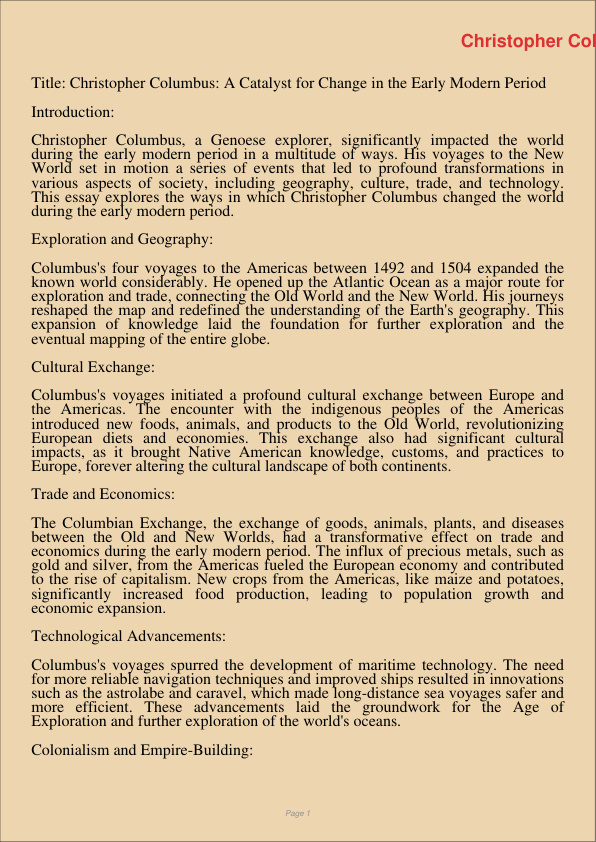Title: Christopher Columbus: A Catalyst for Change in the Early Modern Period
Introduction:
Christopher Columbus, a Genoese explorer, significantly impacted the world during the early modern period in a multitude of ways. His voyages to the New World set in motion a series of events that led to profound transformations in various aspects of society, including geography, culture, trade, and technology. This essay explores the ways in which Christopher Columbus changed the world during the early modern period.
Exploration and Geography:
Columbus’s four voyages to the Americas between 1492 and 1504 expanded the known world considerably. He opened up the Atlantic Ocean as a major route for exploration and trade, connecting the Old World and the New World. His journeys reshaped the map and redefined the understanding of the Earth’s geography. This expansion of knowledge laid the foundation for further exploration and the eventual mapping of the entire globe.
Cultural Exchange:
Columbus’s voyages initiated a profound cultural exchange between Europe and the Americas. The encounter with the indigenous peoples of the Americas introduced new foods, animals, and products to the Old World, revolutionizing European diets and economies. This exchange also had significant cultural impacts, as it brought Native American knowledge, customs, and practices to Europe, forever altering the cultural landscape of both continents.
Trade and Economics:
The Columbian Exchange, the exchange of goods, animals, plants, and diseases between the Old and New Worlds, had a transformative effect on trade and economics during the early modern period. The influx of precious metals, such as gold and silver, from the Americas fueled the European economy and contributed to the rise of capitalism. New crops from the Americas, like maize and potatoes, significantly increased food production, leading to population growth and economic expansion.
Technological Advancements:
Columbus’s voyages spurred the development of maritime technology. The need for more reliable navigation techniques and improved ships resulted in innovations such as the astrolabe and caravel, which made long-distance sea voyages safer and more efficient. These advancements laid the groundwork for the Age of Exploration and further exploration of the world’s oceans.
Colonialism and Empire-Building:
Columbus’s voyages marked the beginning of European colonialism in the Americas. The subsequent conquests by other European powers and the establishment of vast colonial empires in the New World forever transformed the political landscape. This era of empire-building had a far-reaching impact on international relations, power dynamics, and the spread of European culture and institutions.
Historical Memory and Legacy:
Columbus’s voyages also left a lasting legacy in historical memory and identity. While his expeditions are celebrated as a significant turning point in world history, they are also viewed with criticism for the devastating impact on indigenous populations through the spread of diseases, forced labor, and displacement. This complex legacy continues to shape discussions about exploration, colonization, and the treatment of indigenous peoples.
Conclusion:
Christopher Columbus was undeniably a catalyst for change during the early modern period. His voyages not only expanded geographical knowledge but also initiated a cascade of transformations in culture, trade, technology, and empire-building. The legacy of his expeditions, both positive and negative, endures to this day, and his impact on the world cannot be overstated. Christopher Columbus’s journeys are a testament to the profound and far-reaching consequences of exploration and discovery in shaping the course of human history.

「真诚赞赏,手留余香」
真诚赞赏,手留余香
使用微信扫描二维码完成支付
